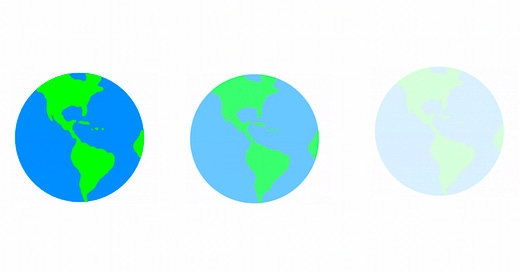Welcome to Young Money! If you’re new here, you can join the tens of thousands of subscribers receiving my essays each week by adding your email below.
In the story of our lives, we are our own protagonists, struggling to accomplish some goal, to reach some destination. We have our own plots and side missions, allies and antagonists, love interests and rivals, successes and defeats.
Some of us are hell-bent on reaching the apex of our chosen profession, others desire to cultivate knowledge and experiences. Some put love and relationships above all else, while others are willing to sacrifice these things to focus on some other singular desire.
We are eight billion humans with eight billion unique stories, and these stories help us navigate the messy world around us.
Of course, every good story needs one key element: a worthy antagonist.
And in the stories of our lives, all eight billion of us share one antagonist: entropy.
The Second Law of Thermodynamics states that the level of disorder in the universe is steadily increasing, and systems tend to move from ordered behavior to more random behavior. This disorder is known as “entropy”.
In A Brief History of Time, Stephen Hawking said, “The increase of disorder or entropy is what distinguishes the past from the future, giving a direction to time.”
Entropy is observable in the breaking down of everything over time. Or perhaps more accurately, entropy is the passage of time.
Take, for example, ancient Rome. Entropy took the greatest city of the old world and left ruins and rubble in its wake.
Back to stories for a second.
The movies and books that we enjoy all end the same: The boy gets the girl, the team wins the championship, the good guys beat the bad guys, the heroes save the world, and our protagonist rides off into the sunset, happily ever after. Let the credits roll.
The difference between the stories that we read and the story that we live is that in the story of our lives, entropy always wins.
Allow me to explain:
Living organisms like you and I are structured, organized networks of cells. But entropy favors disorder over order; it seeks to break down these structured, organized networks of cells. In other words, entropy is the driving force behind aging and death. You can fight it, you can stave it off for a time, but you can never actually defeat it.
We’re all playing this game of life against a stacked deck. The rules aren’t fair, and the game goes something like this:
You didn’t ask to play this game, but as soon as you entered this world, naked, cold, and crying, there was no going back.
You may not like this game, but you have to play.
And, most importantly, you cannot win this game. Maybe you play for 40 years, or maybe you play for 90 years, but eventually, for every single one of us, the game does come to an end. Entropy: 1, Us: 0.
We all know that we’re stuck in this game, but we rarely discuss it. That would just be somber, depressing. Contemplating entropy is contemplating our own mortality, after all, and who wants to do that? So we distract ourselves with politics and sports and all sorts of gossip like, “Did you see what Ashley wore to the office today?”
If we can’t win the game, but we’re stuck playing the game, we might as well ignore the game entirely, right?
At some point, everyone experiences this “Oh, shit” moment where the finite-ness of this game becomes all too real, and once your “Oh, shit” moment hits, you can’t really go back. For me (and I would suspect for most people) that moment came about a year after I graduated college, when I was staring the rest of adulthood in the face and thought, “Damn, is it 40 years of this then I retire and die? That’s it?”
It’s my belief that after having their “Oh, shit” moment, most people spend the rest of their lives actively ignoring this realization until their time is up, because that’s easier to do than facing the reality of our human condition head-on.
Today, I would like you to reconsider this stance. I offer a new perspective: perhaps this game that we’re playing is an opportunity, not a curse.
In Greenlights, Matthew McConaughey said it best, “When we truly latch on to the fact that we are going to die at some point in time, we have more presence in this one.”
And McConaughey is spot on. Once you have that realization, you have two choices: you can dread the inevitable and surround yourself with distractions, or you can acknowledge it, lean into it, and attack life accordingly, knowing you have one shot to do it right.
If you’re reading this right now, you’re alive. You’re still playing the game. Now, we know that at some future point, this game is going to end, but we can’t do much about that, can we? So let’s not worry too much about the end of the game, and focus on playing the game while we’re here.
You can’t defeat entropy. From the second that you entered this game, the ending was written in stone. But the goal isn’t defeating entropy. The goal is fighting entropy.
The problem isn’t that entropy kills you. The problem is that entropy strives to take everything from you while you’re still playing the game.
Entropy isn’t some singular moment separating life and death. Entropy is a process, and entropy wears many masks. Entropy is procrastination, envy, apathy, and malaise. Entropy is the antithesis of excitement, and it’s the opposite of opportunity, optimism, and effort.
The fight against entropy has led to some of mankind’s greatest achievements. Martin Luther King Jr. fought entropy when he sought to unite a struggling, divided nation. The astronauts fought entropy when they set foot on the moon. Professional athletes fight entropy by pushing the human body to its limit on the highest possible stage.
But the fight against entropy isn’t reserved for grandiose accomplishments. It’s a necessary part of our everyday lives.
As I mentioned before, entropy is observable in the breaking down of everything over time. That means:
Entropy degrades your body if you don’t work out.
Entropy ruins marriages and destroys friendships if you don’t cultivate those relationships.
Entropy dulls your mind if you fail to keep it sharp.
Entropy strives to erode your life from a breathtaking adventure to monotonous drudgery.
You fight entropy by rekindling friendships from years past and repairing broken marriages. By pushing your mind and body to their limits through learning foreign languages and getting in the best shape of your life. By connecting with strangers and seeing new parts of the world. By creating something new through art, music, writing, and architecture. By sharing your thoughts with the world.
Entropy thrives on our idleness, but it shirks away from our efforts. Any effort that improves your life in any way is part of that battle against entropy, and these efforts are uncomfortable for a reason. That discomfort, that voice in your head saying, “Why don’t we just do this tomorrow?”
That’s entropy.
A couple of years ago, I was struggling with all of the existential stuff that we all struggle with as I tried to make sense of the world and my place in it. For the first time ever, I was all too aware of my hourglass ticking away, and it messed me up.
I don’t know if “depressed” is the right word, but I felt something. Lost? Hopeless? Confused? Some combination of those? I’m not sure.
I spent weeks trying to ignore those thoughts, to push them out of my head. But once something shakes you to your core, forever altering how you look at the world, you can’t go back. So one day, I stopped running from this problem and decided to face it head-on.
And that’s when this idea of “fighting entropy” began to form in my head, and that idea has only grown stronger over time. To me, life is nothing if not a struggle with entropy, and this idea is so central to me that for the last 18 months, one reminder has popped up on my phone at 7:00 AM each morning.
This story has affected how I look at, well, everything, from my career, to my relationships with friends and family, to how I spend my free time, to everything in between.
Every protagonist needs a proper antagonist, and in the story of my life, entropy happens to fill that role well.
- Jack
I appreciate reader feedback, so if you enjoyed today’s piece, let me know with a like or comment at the bottom of this page!
Young Money is now an ad-free, reader-supported publication. This structure has created a better experience for both the reader and the writer, and it allows me to focus on producing good work instead of managing ad placements. In addition to helping support my newsletter, paid subscribers get access to additional content, including Q&As, book reviews, and more. If you’re a long-time reader who would like to further support Young Money, you can do so by clicking below. Thanks!
Jack's Picks
Noah Smith wrote a great piece on why progressives should actually embrace progress.
Lawrence Yeo’s latest piece on money is the best thing I’ve read all year.






I have been thinking about entropy anf find your article, thank agree with you